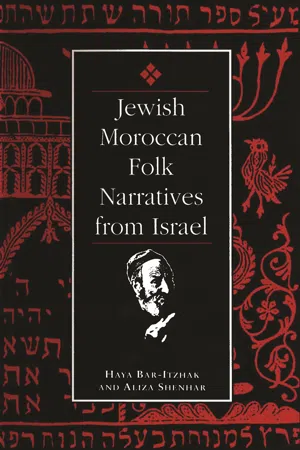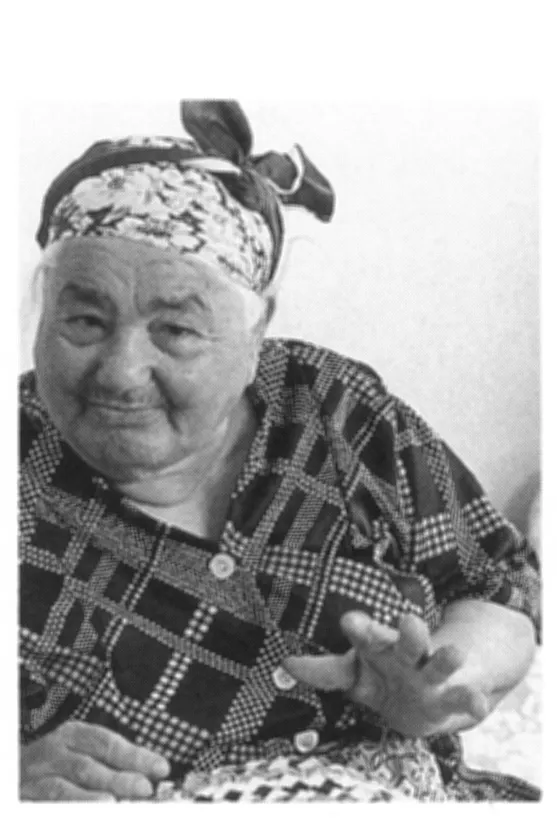ḤAVIVA DAYAN
ḤAVIVA DAYAN was about ninety years old when the narratives were recorded. She came from Marakesh, Morocco, where her parents, David and Sa’ada, lived. In 1954, she and her family came to Israel, where her mother died at the age of ninety. At first, they settled in Massoa, which is next to Hartuv; then they moved to Noam, and they finally settled in Shlomi in 1965. When we recorded her narratives, she was living with her son Asher and his family.
Her husband died forty-three years ago, when her youngest daughter was three months old. He left her some money to live on, but she had to work at all kinds of jobs to provide for her family. Of the thirteen children she bore, only three were alive when we recorded her narratives. She regarded her daughter’s death as especially tragic because she died soon after her son was born. The daughter, who was the mother of five daughters, had wanted a son. Soon after the mother’s death, the son died, too. When Ḥaviva spoke of her daughter, she stressed that she was a pious woman who observed the laws of ritual purification most carefully.
In Morocco, Ḥaviva did sewing, and in Shlomi she stitches colorful cushions using left-over pieces of material.
In her childhood, Ḥaviva would listen to the folk narratives by members of her family on different occasions during the day and on ritual occasions such as Brith Milah (circumcision) and the guarding of the women after giving birth.
She no longer has the opportunity to listen to folk narratives, but she still narrates to the members of her family on different occasions during the day and especially on Sabbath. According to her testimony, family members like to listen to her narratives.
The Patient Wife
FROM: ḤAVIVA DAYAN
Let me tell you, God was everywhere. Until there was a rich man.1 Come to this rich merchants’ house and see for yourself: he did not beget any children. He would fast, distribute money, write amulets, and visit the tombs of saints, until finally one daughter was born to him. She would say to the sun: “Shine, or I will shine on God our Maker who created both you and me.” In beauty and stature, in her whiteness and crimson she was the image of perfection.
The daughter grew up. Whenever someone asked for her hand in marriage, the father would say: “He who does not give me three kuntars2 of goods cannot marry my daughter.”
They said to him: “What are the three kuntars for?”
He said to them: “One for her beauty, one for the hair she virtually walks upon, and one for her patience.”
One man rose and said: “Her beauty—we see that she is very beautiful; her hair—we see that no other girl has her hair; but patience—what if she is not patient?
He said to them: “You try her out for a year. If, at the end of this period, you find that she is not patient, I shall return the kuntar you gave me for her patience.”
All the young men in the town asked for her hand in marriage, but none could raise three kuntars of goods, the poor creatures.
One day, as they were all sitting in the coffee-house and playing games, the girl went by; she was going to the bath-house.
Now a wealthy merchant from another town arrived in the town. He came with two suitcases full of money and wanted to have a good time. He saw the young men sitting in front of the coffeehouse. He asked them: “What are you doing?”
They said to him: “We are playing cards, or checkers, or other games.”
He sat down with them. He said to them: “Have you paid for the coffee you are having? If not, I will pay.”
What did it matter to them?3
They said to him: “The coffee has already been paid for, but if you want to stand us another round, do so—why not?”
They brought them the cups of coffee, and as they were drinking the man raised his eyes and saw the girl who was returning from the bath-house. She radiated beauty. The instant he saw her he froze in his seat, as if stung.
He said to them: “Are you single or are you married?”
They said to him: “We are single.”
He said to them: “You have this superb beauty of a girl in your midst—not married, not engaged?”
They said to him: “Not married, not engaged, and still a virgin.”
He said to them: “Are you dead, or are you alive? You have this beautiful girl in your midst, and you don’t get married?”
They said: “Her father won’t let us. He demands three kuntars, and we do not have that kind of money. Everybody in this town has asked for her hand in marriage, but he will not give her to anyone, seeing that nobody has three kuntars.”
He said to them: “I will give him six kuntars so I can marry her tonight. If he does not agree I will die.” (He sees so beautiful a girl—and she does not belong to anyone.)4
They said to him: “Good, let us call the matchmaker.”5
They went and called the matchmaker.
He said to him: “Go and ask for the hand of this girl in marriage.”
He said to him: “Brother, I will not go and ask for her hand in marriage. Her father warned me, saying: ‘Anyone who does not bring me three kuntars of goods—even if he says he has them and will give them to you, do not come to me. If you do not bring the goods, don’t you ever come here.’”
He said to him: “I will give him four kuntars as long as you go and ask for her hand in marriage.”
He said to her father: “A Jew who lives in another city is in town. He has lots of money, he is a rich man.”
He said to him: “Will he give me three kuntars worth of goods?”
He said: “He will.”
The young man said: “What are the three kuntars for?”
He said to him: “One kuntar for her beauty, one kuntar for her hair, and one kuntar for patience.”
He said to him: “Good. But let us make a deal: I will give you the money I carry in my suitcases. For the balance, I will go back to my town. I will transfer my business to this city, I will buy a store and a home, and I will live here. And the wedding will be in two weeks.”
He said to him: “Go.”
He went back to the town where he lived. He sold everything. He sold expensive things for little money, he brought money, he brought furniture, he brought a bus, he kept bringing things.
Good. He married the girl, there was a big wedding—none but God is great.
Good, when he married her—when he looked at her, he saw a hundred faces. She would dress up, and they would go out together.
She became pregnant; she had a boy. The child was one year old; when he was in his second year, she was sitting at home when her husband came home from the store. He knocks on the door.
She said to him: “Who is it?”
He said to her: “Open the door, open the door, open the door, I am going to die. The pain that started when I was in the store is going to kill me.”
—“I am your substitute, I am your compensation, I am your redemption.6 Whatever is to happen to you, let it happen to me.”
She opened the door; he entered.
She said to him: “But why do you come here? why do you come to me? Go and see a doctor. Do you want me to go to the doctor with you?”
He said to her: “No, no. Don’t go to the doctor with me.”
He left. For half an hour he sat with his friends, plays, laughs, and feels happy. Then he went back home.
She said to him: “Did you go to the doctor?”
He said to her: “I did.”
She said to him: “And what did he tell you?”
—“He told me that if I have a son or a daughter I must slaughter him and drink his blood and smear his blood on my body in order to get well.”
She said to him: “He is turned about and sacrificed instead of you.”7
She took the child she had borne, who was by now two years old, washed him, dressed him, kissed him, and gave him to his father.
He took the child. Where did he take him? Let us say to a place as far away from his home as is Nahariya from Shlomi, to a teacher who instructs the children of the wealthy. He called her and said: “My daughter, you take care of this child, and I will pay all your expenses. Give him the food the rich eat, and dress him the way the rich dress, and I will pay for everything.”
He went to his store, washed his face and hands, and went home.
She said to him: “Well, what happened?”
He said to her: “Good, my daughter. I felt a little better, and I dropped in on my friends. I did not want to come home with blood all over me.”
She said to him: “And what did the doctor tell you?”
He said to her: “What did he tell me? He said I should sleep for half an hour, have lunch, and go for a ride in a taxi cab in the evening.”
They ate, and they drank. Her servant, who had been a servant in her father’s house, and who had been given her by her father as a gift, helped her. She dressed, she washed, she put on makeup, and they went for a ride in the car, till eight o’clock in the evening.
Good, she became pregnant again. Pregnant for nine months, three months—on heat, three—getting fat, and three—she clutches the rope.8 “He who saves from trouble, may He save her.”
She had another baby, a boy even more beautiful than her first child.
Good, she was happy: she dresses him, she gives him food, she gives him drink, she takes him for a walk—until he is two years old.
He is two years and one day old, and again she is at home when suddenly her husband arrives. He knocks on the door.
She said: “Who is it?”
He said to her: “Open the door, open the door, open the door, I am in pain. The pain is going to kill me.”
—“I am your substitute, I am your compensation, I am your redemption.”
He enters the room.
She said to him: “Why did you come to me? Go to the doctor. Do you want me to go with you?”
He sa...



